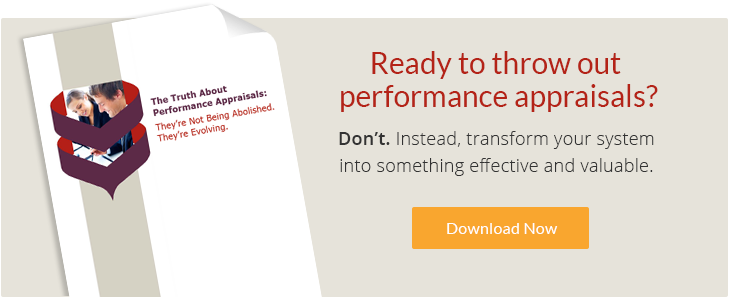How Missing One Performance Appraisal Can Damage Productivity

Employees need – they desperately want – feedback from their supervisors. While many suggest the benefits of informal feedback, passing down the hall or a casual conversation about the latest team project, there are benefits to integrating formality into the conversation. Performance appraisals guide this formality into the performance-centered discussion so the review is measurable. However, when just one performance appraisal is missed, several other things fall by the wayside and productivity begins to waiver. Ignore these warnings at your own risk…
Missing the Mark
Without regular feedback and discussion with supervisors, employees can get off track on long-term goals or even larger projects. On a greater scale, this results in consistent underperformance. Jennine Heller (@boosterstage), Performance Coach for Executives and Managers, said:
“Does your employee know what they are supposed to be doing? This may sound like a silly question, but lack of clarity on roles and responsibilities can create a discrepancy in performance expectations. Make sure expectations and metrics have been clearly defined and communicated.” [1]
How can you remedy this misunderstanding (or complete lack of understanding) of these expectations? Regular one-on-one discussions between employees and their supervisors through performance reviews as part of a successful talent management strategy.
Low Individual Performance Standards
Whether they get caught up in the Friday discussions of weekend plans or gossip from a few offices down, managers might see dips in work quality. If employees haven’t been truly hitting their performance standards, whatever the reason may be, failing to address the performance problem and follow-up regularly allows the problem to continue. Dr. John Sullivan (@DrJohnSullivan), Corporate Speaker and Advisor Contact, said:
“If your performance management process is weak, it will not identify many of your poor performers. It may also be overly tolerant and prolong the releasing of poor performers who cannot improve.” [2]
Low performance standards aside, without regular employee reviews they can’t (nor can their managers) truly track their progress to reaching professional or company goals. This underperformance, the inability to complete company projects and goals efficiently and correctly, often results in termination. You can reduce and hopefully eliminate terminating the 15% of employees who are let go due to underperformance simply with consistent communication. [3]
Benefits of a Performance Appraisal
These are just two of the problems you can fix with a regular system of performance appraisals. By maintaining a consistent review process, you can track and measure employee performance. Currently, 80.7% of employers measure each staff member’s overall performance. [4]
However, by following-up with employees after their reviews, you can track employee progress towards individual and group oriented goals. It gives managers the opportunity to connect employee aspirations and their work to the overall impact of the company.
Employees crave feedback on their performance. Failure to conduct regular performance reviews – even skipping a single performance appraisal – can degrade the quality of their work and lower their personal performance standards. Because performance management has grown into the idea of a consistent feedback system, skipping a review can damage your overall program as it often serves as the cornerstone. Don’t ignore or neglect a performance appraisal; reschedule if you need to, but avoiding it will only make the employee’s performance worse.
Sources:
[1] – Inc.com – How to Manage an Underperforming Employee
[2] – ERE.com – A Low Turnover Rate Could Mean You Have Ugly* Employees
[3] – Payscale – The Low Down on Employee Turnover
[4] – HR Hero – Despite Flaws, Survey Finds Employers Sticking Performance Evaluations
Explore Related Topics:
- Are You Missing a Key Performance Metric?
- What to Do When Your Performance Management Strategy Fails Big Time
- How Does Employee Engagement Affect Performance?

